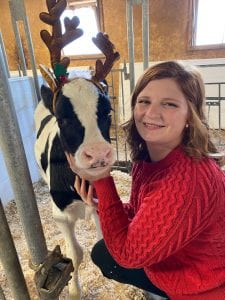Title: Application Scientist at Chr Hansen
Email: DKASHA@chr-hansen.com
What is your background and how did you become interested in the dairy/food industry?
I started off in the field of biology with a focus on molecular biology and microbiology. My undergraduate research at the National Reference Laboratory for Listeria monocytogenes in Germany lead me to the research from Dr. Martin Wiedmann’s Food Safety Lab where I pursued my PhD in Food Science. My research sought to better understand what drives growth and survival of foodborne pathogens in food processing plants, as well as in challenge and validation studies. The direct translation of my research findings into the real world and to contribute to safer, more wholesome food was a key motivation.
What was your Cornell experience like? (i.e. coursework, dairy related activities, internships, jobs, etc.)
I experienced the Food Science Department as a very supportive, well connected community that allows their students to grow, as well as to learn and explore the various aspects of food and food systems beyond their research focus. We got to meet experts from the food industry on various occasions through seminars and advisory council meetings, allowing us to build connections and learn about future job perspectives. The coursework for students also offered relevant training and certificates including GMP, HACCP and SQF. In addition, I had the chance to join the dairy extension workshops and got to learn about cheese making or got sensory training as a cheese taster. There were also many occasions in which I got to go out into the field, visit dairy plants across New York State as part of environmental monitoring projects. However, what I enjoyed the most during my stay at Cornell was working with and learning every day from the people in the Food Safety Lab and the Milk Quality Improvement Program under the mentorship from Dr. Martin Wiedmann.
What is your current role in the food industry, and how does it impact the dairy industry?
As an application scientist in the Dairy Bioprotection Team I am working on food cultures with bioprotective effect (i) to extend the shelf life of products, which allows us to reduce food waste for a more sustainable future, (ii) to keep products fresh longer, or (iii) to offer a natural solution for product preservation, i.e., if you would like to remove chemical preservatives from your ingredient list. Our adjunct cultures are natural microbial food cultures that take part in the fermentation and delay the growth of yeast and molds, and enhance food safety. My role involves conducting application trials in our pilot dairy, challenge tests or other product analyses in the lab and further down the line field trials with customers. I am contributing to the development of new cultures, and will be providing technical support to customers for the application of the current product line around the world.
How did your Cornell training impact your career in the dairy/food industry?
My training at Cornell equipped me with the essential skills and tools needed to get started in my current role, including skills on the technical side, e.g., microbiology expertise, knowledge about food production, but also soft skills, including project management, working interdisciplinary and as a team. Having had the freedom to do internships helped me solidify my career choice to join the industry in culture applications and strain development. It was in my second year at Cornell that I met scientists from Chr Hansen who introduced me to their company. I’ve been interested in joining Chr Hansen ever since and I am more than happy that I get to be part of their Bioprotection Team now.


